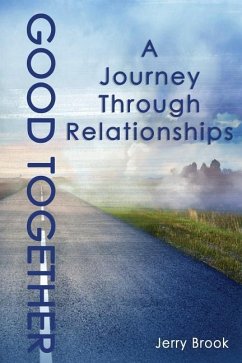Good Together is not like any other relationship treatise. Jerry Brook won't tell the reader how to get the woman or man of one's dreams. He won't tell how to get along with one's boss or co-workers. Instead, he debunks the current advice-love is war-relationships should be unconditional-relationships are hard work; -He helps people realize their own motivations first and figure out others second; -He teaches readers how to understand certain aspects of themselves-what drives decision-making and communication; -Readers learn how to communicate and thus create a relationship worth having. Part One shows us the roadmap, reasons for mistrusting the conventional wisdom of relationships-intimate, business, social-and replaces that wisdom with the advice to "know thyself." Relationships aren't complicated. We all are in them from the beginnings of our lives. So why are we always running up against one another, falling out with family, friends and co-workers, leaving and joining new intimate relationships? Because every relationship needs the same components: -Trust -Verification -Understanding -Communication It's HOW we go about understanding and communicating those values that allows us to be successful. Brook presents his persona model: -Realizing types of personalities; -identifying roles we play in relationships; -knowing the actors; and -recognizing the kind of drama we're in for. So what to do about the persistent advice of "You Need to Communicate"? This chapter details the forms, styles, and behaviors of communication we use every day in every relationship. Part Two is where the journey begins: -"Stages": the way a relationship-intimate, business or social-progresses (most intimate relationships hit their low point at four years not the seven-year itch as we've been told); -"Styles": how people in the relationship view it (the style is closely allied to the purpose); -"Synchronicity": how to think about the relationship once it's in swing; and -"Reassessment" lays out a plan of determining "satisfaction vs. un-satisfaction." Part Three warns of the detours along the route: -Lying; -Cheating; -Forgiveness; and -Conflict resolution, with four ways in which we can come to forgiveness, if desirable. Ultimately, Brook teaches readers how relationships are "Choice, not Chance."
Hinweis: Dieser Artikel kann nur an eine deutsche Lieferadresse ausgeliefert werden.
Hinweis: Dieser Artikel kann nur an eine deutsche Lieferadresse ausgeliefert werden.








